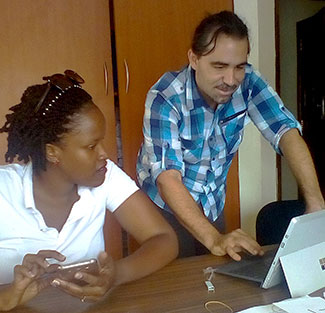Profile: Fogarty Fellow Dr Eric Coker sheds new light on Uganda's indoor air pollution
May / June 2019 | Volume 18, Number 3

Photo courtesy of Dr. Eric Coker
As a Fogarty Fellow in Uganda, Dr. Eric Coker trained local women health workers in data collection, consent and environmental health, and then went out in the field to sample the air in homes in Kampala’s slums. He used the data he and his team of health workers gathered to improve understanding of the complex interplay between indoor air quality and poor respiratory health in Ugandan children. Persistent cough is the main reason why children present at government-run health clinics in the Ugandan capital, Coker explained, and the WHO has blamed soot inhaled from household air pollution (HAP) for nearly half the pneumonia deaths among children under 5.
Cooking indoors with solid fuels such as biomass, coal or kerosene is one of the chief sources of indoor pollution, and, over the years, initiatives supported by Fogarty and other NIH Institutes and Centers have sought to reduce HAP by studying clean cookstoves and fuels for use in low- and middle-income countries (LMICs), such as Uganda. But preliminary findings from Coker’s fellowship research indicate that projects that are too narrowly focused may not be enough to reduce the health risks posed by HAP.
“Big interventions are being rolled out for cooking fuel replacement and improved cookstoves, but we’re seeing insufficient reduction of HAP and few health benefits,” Coker said. “If we don’t take a more comprehensive view of the problem, we may be putting a lot of resources into something that will not have the benefit we’d hoped for. My hypothesis going into the Fogarty fellowship was that we need to consider all sources of air pollution and all the ways available to people to protect their health.”
In roughly half the homes Coker sampled in Kampala, meals were cooked indoors. As expected, he found that pollutant levels in those homes were about four times higher than in households where food was prepared outside, and seven times higher than the WHO standard. But Coker also observed wide variations in the prevalence of cough in homes where cooking happened indoors. If windows were opened and children were outside during cooking times, and if the home had electric lights, around 30 percent of children living in the home had a persistent cough, similar to the study population baseline. In homes with kerosene for lighting, where windows were kept shut, smoking indoors was common, children were inside during cooking times, and self-reported traffic-related air pollution was high, the percentage soared to 90 percent of children.
“From the comfort of a postdoctoral office, I would never have been able to understand just how intricately health, indoor pollution and living conditions in Kampala are interwoven,” Coker said. “The direct field experience that a Fogarty fellowship offers early-career scientists is hugely important.”
Coker also attributes his current faculty position at the University of Florida’s Department of Environmental and Global Health to the year-long fellowship, as well as his continuing collaboration with researchers he met in Uganda. His project in Kampala also underscored to Coker the importance of educating ordinary Ugandans about the health hazards they face doing everyday activities like cooking. “In the first home I visited, indoor air pollution levels during cooking were several hundred times higher than what the WHO says is health-protective. And yet, the man of the home was unaware of the hazards this posed. He asked me, ‘Is cooking indoors dangerous?’” Coker recalled.
To counter such lack of awareness, Coker advocates community-driven education programs that generate solutions tailored to the local environment. To incorporate basic awareness-building into his fellowship project, Coker had community health workers hand-deliver letters to the people whose homes had been sampled, outlining factors that could be contributing to HAP and steps to take to improve air quality. On a future trip to Uganda, Coker hopes to follow up with the impacted communities and promote more community-driven solutions to HAP and its profound public health impacts.
More Information
To view Adobe PDF files,
download current, free accessible plug-ins from Adobe's website.